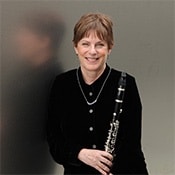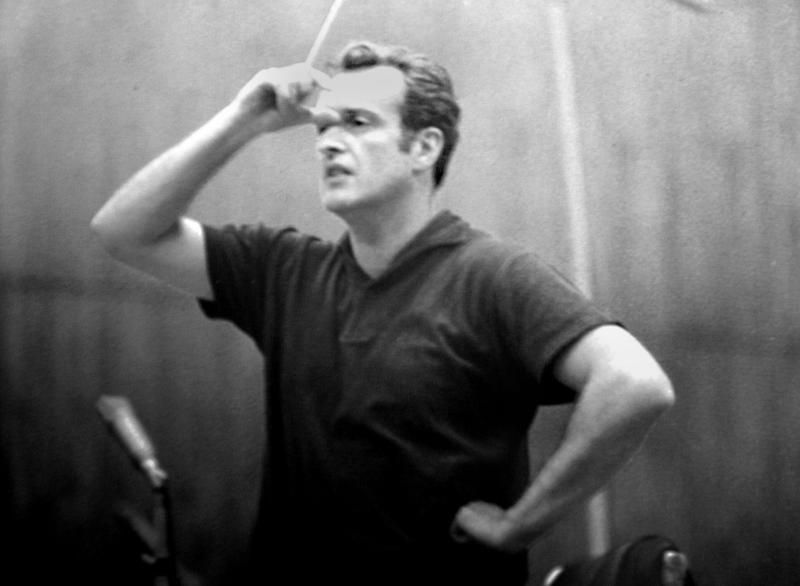After 54 years, LA Phil principal thinks auditions suck
mainWhat Michele Zukovsky says is: ‘The audition system itself is flawed, but it’s the best we got.’
She is stepping down as principal after more than half a century.
What she prefers is this: ‘Some of those wilder, more interesting individual players, like Roger Bobo or myself … I call them “lopsided players.” Those kind of guys are the ones that perk up your ears but may not do everything great, like my father. He tried out for Otto Klemperer, and there were only two people, him against one other guy. He just played while Klemperer was at the piano, and he just played some Wagner or some solo piece. Klemperer heard him and just hired him. He didn’t play one single excerpt from the orchestral repertoire.’
Those were the days.
Read CK Dexter Haven’s full interview with Michele here.

‘Don’t bother you’re not coming back,’ she told the conductor. Read second instalment here.





I agree with her. I have sat on several audition committees in a big orchestra too.
The system is terrible and many great players slip through the cracks. But the one who gets the job is usually the one great player who didn’t slip through the cracks. Usually.
This is an American thing, in general. Some orchestras even have a standardized list of excerpts as specified by the Union. So candidates come and play short 10-30 bar clips that they have practiced to death for years, to compete for a job. Some candidates can be “programmed” by a coach to the point that they don’t even need to be thinking musicians.
Every orchestra should have a completely unique audition list and should only release it 4 weeks before an audition. Furthermore, they should give each candidate 2 other selections when they arrive at the audition, which MUST be asked in that round, for which they will have 1 hour to prepare during their time in the warm-up room. A system like that would find better candidates; certainly better than a standardized list which is exactly the same for every orchestra that every candidate has spent years practicing.
A very interesting comment that provides great possibilities for auditions. It raises again the perpetual problem of unions in American orchestras.
“It raises again the perpetual problem of unions in orchestras”
No, it doesn’t. The Union rarely (if ever) has any influence over an actual audition list. Their interest is in the fairness and anonymity of the process, but even that is ultimately the orchestra’s decision. Audition procedure is one of the areas in which the Union has the least influence or interest.
Your comment reminds me of people who enter pretty much any discussion and blame whatever problem is being discussed on Obama….
Non-existing perpetual problems are always the most attractive. They never go away so they can be endlessly railed against and since they never need be solved, the failure to implement a solution can be eternally lamented.
There is a big difference between saying that a certain process “sucks” and stating that it is imperfect but there is none better. She did not say that she “prefers” the old way, either. In fact, the way she described it, it sounds far more “flawed” than the current practice.
Oh facts, facts facts! Who cares about facts if they stand in the way of a juicy headline?
Well, there is the “on tryout” method where people seem to regularly play with an orchestra for years on end. And then the position goes to someone entirely different …
Genuinely creative musicians like Roger Bobo often leave orchestras and never look back. The rigid hierarchies, authoritarianism, conveyor-belt repertoire, performance practices burdened by mindless orthodoxies, and cultural plutocracy of orchestras are antithetic to creativity. As a result, orchestras are often bad places for creative people.
This is often painfully obvious when orchestra musicians perform as soloists. The imperative to always blend with the group, to always march in step, as it were, creates soloists that are stiff, wooden, and colorless.
This makes it all the more grotesque that our best schools focus almost exclusively on orchestral training. This also explains why American wind players generally fare poorly in international competitions. Our best schools typically hire orchestra musicians as teachers, who pass their one-dimensionality on to their students. In the music world, there is a term for this phenomenon: orchestra zombies.
Yes, I have often thought this to be the case in the past 40 years or so, but in the past, when conductors made the choices or took recommendations from trusted principals in other orchestras, the players were more “interesting”. The principal wind and brass players in the Boston Symphony during the tenures of Koussevitsky and Munch are a clear case in point. Idiosyncratic players like Roger Voisin and Armando Ghitalla would never be hired nowadays. (Ghitalla says that he missed the famous leap to high C in Zarathustra three times in his audition for Munch but Munch hired him anyway. Munch did so because he heard the great opera singer “inside” Ghitalla’s playing.) Principal horn James Stagliano was wildly uneven from night to night but at his best (i.e. sober), he was a beautiful player. He’d have never survived the current process. A recent exception (but one that supports Mr. Osborne’s point): BSO principal oboe, John Ferillo, a wonderfully colorful player. He failed 50 auditions before landing the principal oboe in Phoemix. And then at some point, James Levine heard what he had to offer and, by that time confident enough to pass the preliminary rounds, Ferillo caught the ear of the Met’s MD and was hired there and, later, at the BSO.
Cool story about the MET, but didn’t Ferillo just play screened rounds of auditions for their commitee, SANS Levine, and win the job on his own?
Their contract does not allow the MD to be present and no candidate ever plays without a screen, as of the modern era.
I thought that the MD had to approve or disapprove the choice at some point, but you could be correct. Another oboe story. When Al Genovese (another great individualist) left the Met Orchestra to join the BSO, Levine told the players they had just lost “one of our greatest singers”. So true! But when Al was in Boston, he was for many years given only the “acting” principal oboe position, and Ozawa, who apparently had trouble with independent spirits, only grudgingly gave him tenure after holding several additional rounds of auditions. It was a humiliating experience that Al never forgot or forgave.
Ghitalla already was 3rd trumpet when Leinsdorf arrived and wanting to get away from the French trumpet sound prevalent in Koussevitsky and Munch eras. He switched Ghitalla and Voisin’s chairs.
John Ferillo joined the Boston Symphony in the summer of 2001, and James Levine was announced as the orchestra’s next Music Director that fall; he didn’t assume the MD position for several more years. So Ferrillo’s audition process happened well before James Levine arrived in Boston. Even when he became MD, Levine stayed out of the audition process, although he could weigh in on tenure decisions later.
I studied for a summer with Ghitalla, a truly great musician and a great human being as well. It’s true that more formalized audition procedures too often filter out the most interesting players. I also think that the training of musicians became more orthodox. Musical concepts and pedagogical techniques have become so standardized that orchestra musicians have moved away from being artists and function more as artisans. The Chicago brass sound, for example, has become a worldwide franchise. Another problem is that the limited amount of rehearsal time, and the use of rather generic star conductors who spend little time with orchestras, flattens out the creative spectrum. There’s simply no time to explore and develop new concepts of interpretation. Even the most idiosyncratic orchestras, like the VPO, are falling victim to this standardization of musical sound and interpretation. I really like Ms. Zukovsky’s idea that we should be more ready celebrate the mavericks of the orchestral world.
Allow me to add the clarinetist Gino Scioffi to your list (I’m not quite sure of the spelling). Munch was never interested in technical perfection; he was all interpretation and inspiration and never conducted the same thing twice in the same way. The musicians you listed were the perfect match for his style. I hasten to add that they were also great technically.
Gino Cioffi was like a cat who is at the top of his game the day you look him over for adoption and then, once settled in to your household, gets more recalcitrant and unbearable with each passing day. In the first couple of Munch seasons, Gino played wonderfully but then little by little couldn’t have cared less. By the time Leinsdorf arrived, the intonation was consistently a quarter-tone flat and he also had the annoying habit of conspicuously packing up his instrument while the last piece was still going if he had no more to play.
At the time, the BSO played at A-444. I heard that having come from the Met’s A-440, Cioffi refused to shorten his clarinet barrels or buy new ones.
Most of you all am missing a big point here. The lady retiring was fantastic. She was a giant musical personality. When I had the pleasure/honor to hear and perform with her, I sat on the edge of my chair. She played with style.
Part 2 of the interview just came out! It’s GREAT!
http://allisyar.com/2015/12/20/a-chat-with-michele-zukovsky-part-2-of-2-on-german-clarinets-german-conductors-life-after-the-la-phil-and-more/
Life lesson: The audition process usually doesn’t suck too much if your parent or lover is on the audition committee.
She’s absolutely right; and so is Mr. Dicterow. In the city where I went to school the major orchestra has demonstrated this quite eminently. Things only get worse when one approaches conducting auditions.
Lots of whining going on here.
Michele was amazing – plain and simply amazing.
Orchestral training is what the players want to do, and is the point of going to Music School. Otherwise just get a liberal arts or Ed degree.